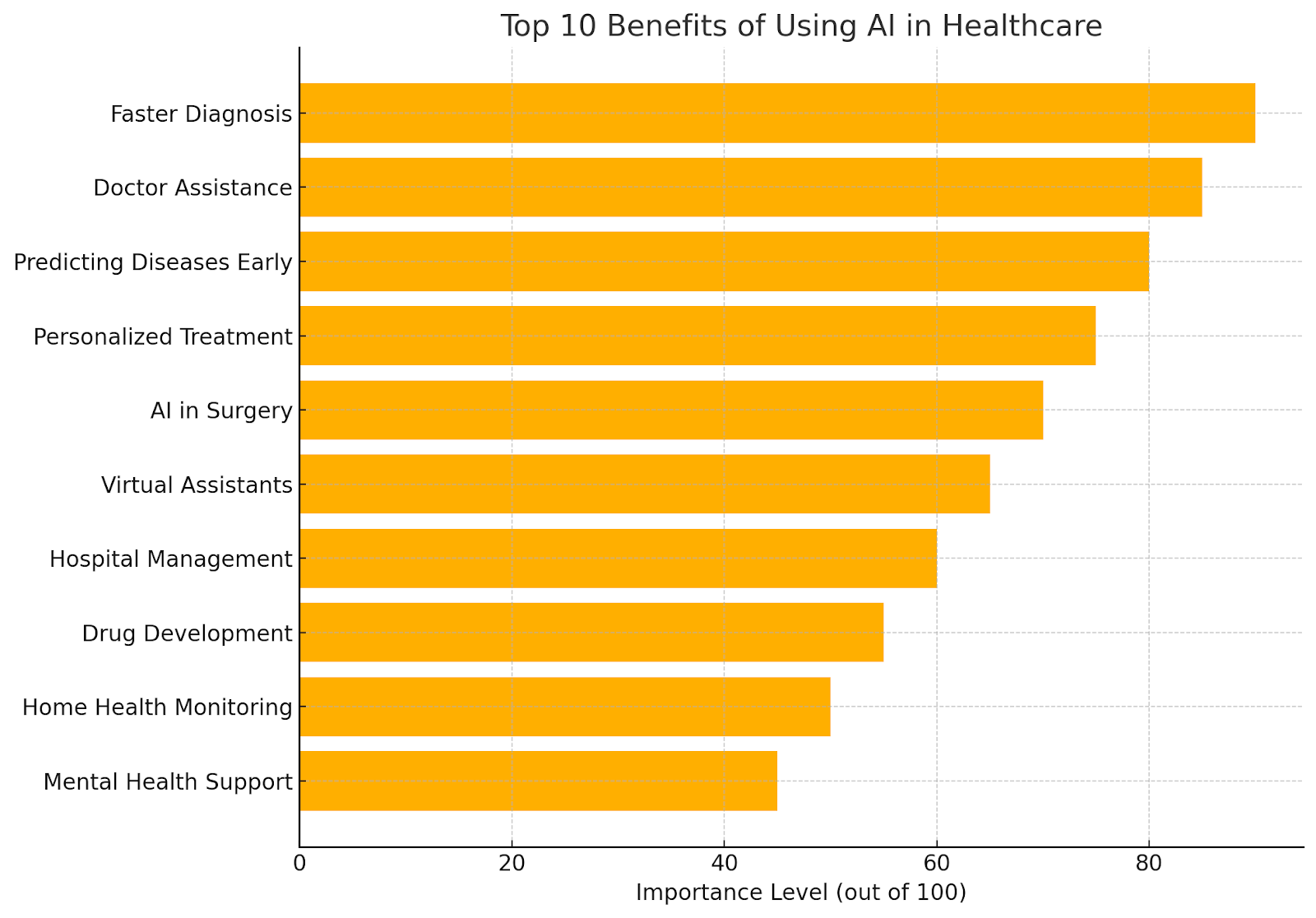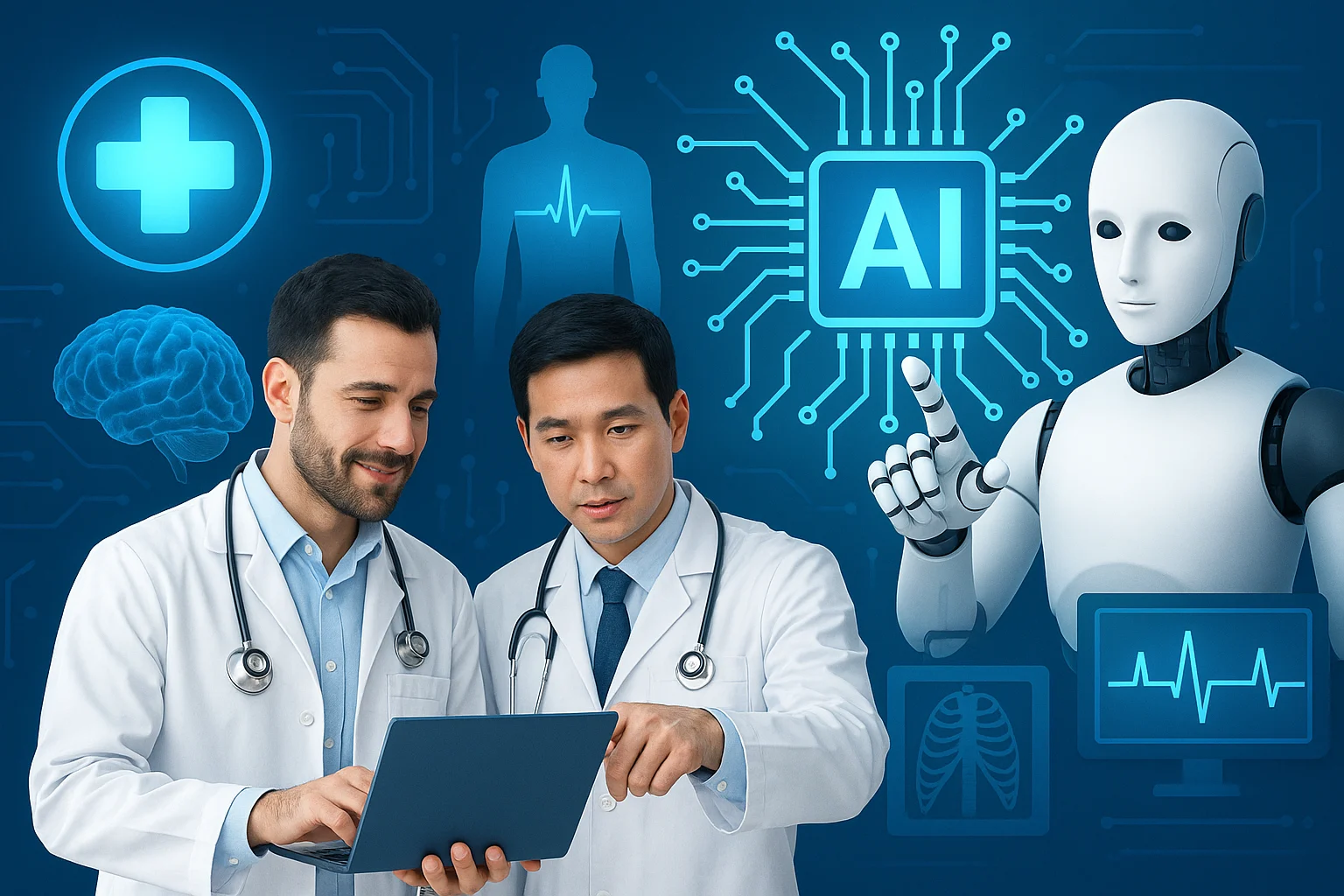 OVERVIEW
OVERVIEW
AI in healthcare means using smart computer systems to help doctors, nurses, and patients. These computer systems can think, learn, and make decisions like humans. They help in many parts of healthcare such as finding diseases, checking test results, planning treatments, and even talking to patients.
AI tools can look at thousands of medical reports, images, and patient data in seconds. This saves a lot of time. It also finds things that a human doctor might miss.
 Why Is AI Important in Healthcare?
Why Is AI Important in Healthcare?
Healthcare is one of the most important services. But many countries face problems. There are not enough doctors. Hospitals are busy. Waiting times are long. Mistakes can happen.
AI helps solve these problems. It works fast. It never gets tired. It can look at huge amounts of information and give accurate results. That is why hospitals around the world are using AI more and more.

 Benefits of Using AI in Healthcare
Benefits of Using AI in Healthcare
Let’s explore the biggest benefits of using AI in healthcare.
- Faster and Better Diagnosis
- Helping Doctors with Smart Tools
- Predicting Health Problems Early
- Personalized Treatment Plans
- AI in Surgery
- Virtual Health Assistants
- What medicine should I take?
- What аre the side effects?
- When should I see a doctor?
- Managing Hospital Work
- AI in Drug Development
- Better Health Monitoring at Home
- Heart rate
- Sleep quality
- Oxygen level
- Steps taken
- Help in Mental Health Support
Doctors often need to look at many tests like X-rays, MRIs, and blood reports. Sometimes it takes hours or even days to find what’s wrong.
AI tools can read medical images and test reports very fast. They can find diseases like cancer, lung infections, or brain problems in seconds.
Example: AI can detect breast cancer from a mammogram.
This means patients can start treatment earlier. This can save lives.
AI does not replace doctors. It helps them. AI can suggest what the doctor should check. It can alert if something is wrong in the report. This makes doctors more careful and confident.
Stat: According to the NIH, AI systems matched or outperformed doctors in 87% of diagnostic tasks.
So, AI helps reduce human errors and improves care.
AI can also look at patient data and guess who might get sick in the future. This is called “predictive analytics.”
For example, AI can check if a person has high sugar levels, poor sleep, and less exercise. Then it warns that they may get diabetes in the next few years.
Doctors can use this warning and help the patient take steps early. This prevents the disease.
Each person is different. So, оne medicine for treatment may not work the same for all. AI helps doctors create special plans for each patient.
AI looks at a person’s health history, age, gender, and other details. Then it suggests what treatment will work best for them.
This is called “personalized medicine.” It gives better results.
AI also helps during surgeries. Robots controlled by AI can help doctors perform very delicate surgeries. These robots have very steady hands. They don’t shake or get tіred.
Example: In the U.S., hospitals use AI-powered robots in surgeries. This leads to faster recovery and fewer mistakes.
AI can work like a helper on your phone or computer. You can ask it questions like:
These helpers are called “chatbots” or “virtual assistants.” They are available 24/7 and help people who live far from hospitals.
Stat: Over 21% of healthcare providers in the U.S. now use AI-powered chatbots for basic patient support.
Running a hospital is not easy. There is a lot of paperwork, billing, and appointments. AI can help with this. It can schedule patient visits. It can send reminders for check-ups. It can also help with billing and insurance. This saves time and reduces mistakes.
Making new medicines takes a lot of time and money. AI can speed up this process. AI can test many chemical combinations in less time. It can also find which drug might work best for a disease. This means new medicines can reach patients faster.
AI tools can help patients stay healthy at home. Smartwatches and fitness bands use AI. They check:
If something is wrong, they alert the user. This way, patients can take care of their health every day.
Stat: Over 320 million wearable health devices were shipped globally in 2023, and most of them use AI for tracking health.
Mental health is a big problem today. Many people feel sad, stressed, or anxious. But they may not go to a doctor. AI can help too. AI chatbots can talk to people and ask questions. If a person is feeling very low, it can alert a real doctor.
Apps like Woebot and Wysa have helped millions talk about their mental health using AI. It is private, easy, and helpful.
 Challenges of Using AI in Healthcare
Challenges of Using AI in Healthcare
AI is very useful. But there are some challenges too.
- Privacy: AI tools use a lot of data. We must protect people’s personal health data.
- Mistakes: AI is smart but not perfect. Sometimes it can give wrong advice.
- Training: Doctors and nurses need to learn how to use AI tools.
So, AI should always work with human doctors, not replace them.
 The Future of AI in Healthcare
The Future of AI in Healthcare
AI is growing fast. Experts say the global market for AI in healthcare will reach $188 billion by 2030, according to Statista. More hospitals, clinics, and patients will use it.
- In the future, we may see AI doing more:
- Scanning full body health in minutes
- Giving early alerts for major diseases
- Recommending food and exercise plans
- Assisting in rural and low-income areas with fewer doctors
 Final Words
Final Words
AI is making healthcare smarter and better. It helps doctors, patients, and hospitals. It can find diseases early, suggest treatments, and support people from far away.
Still, we need to use it carefully. It must always support the work of real doctors. If used right, AI can save lives and make healthcare easier for everyоne.
Let’s learn and use this smart technology to build a healthier world.

